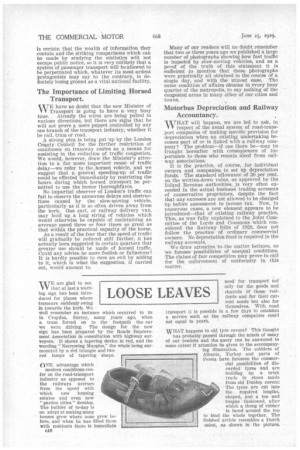Motorbus Depreciation and Railway Accountancy. •
Page 40

If you've noticed an error in this article please click here to report it so we can fix it.
1,7i THAT will happen, we are led to ask, in V respect of the usual system of road-transport companies of making specific provision for depreciation when an existing undertaking becomes part of or is linked with a railway company? The problem—if one there be—may be fraught hereafter with consequences of importance to those who remain aloof from railway associations. It is the practice, of course, for individual owners and companies to set up depreciation funds. The standard allowance of 20 per gent. on the written-down value, as approved by the Inland Revenue authorities, is very often exceeded in the actual business trading accounts of conservative proprietors, despite the fact that any excesses are not allowed to be charged up before assessment to income tax. Now, in numerous cases, a new element appears to be introduced—that of existing railway practice. This, as was fully explained to the Joint Committee of the Lords and Commons which considered the Railway Bills of 1928, does not follow the practice of ordinary commercial owners. No depreciation fund is required in the railway accounts. We draw attention to the matter betimes, as we foresee possibilities of unequal conditions. The claims of fair competition may prove to call for the enforcement of uniformity in this matter.












































































































